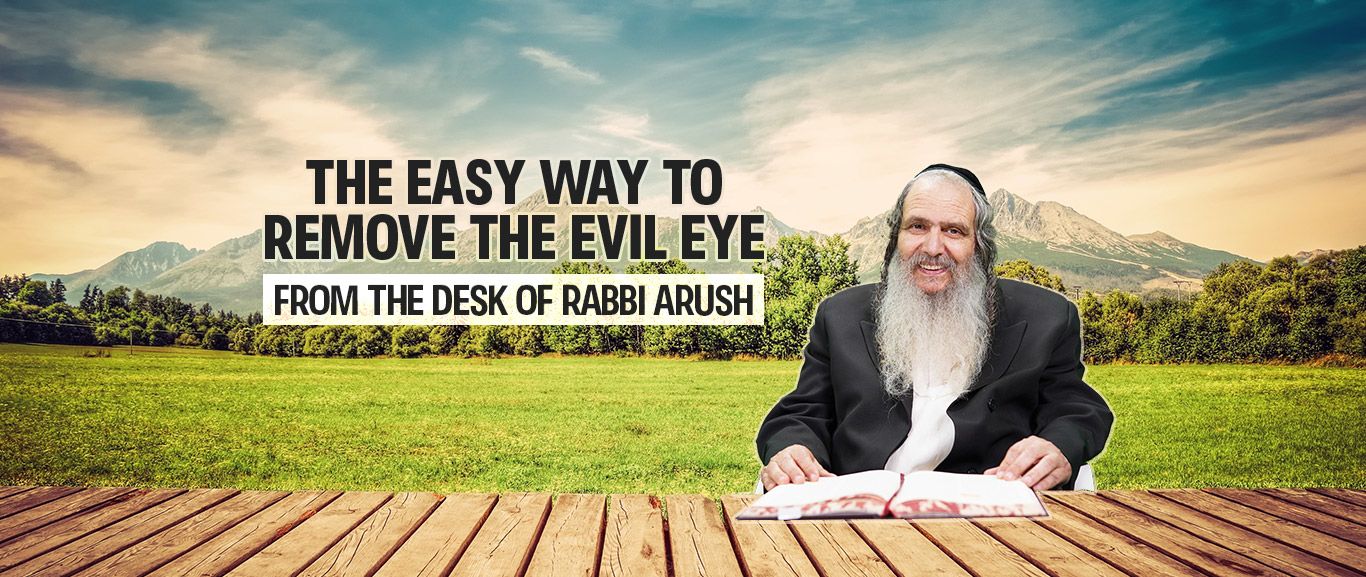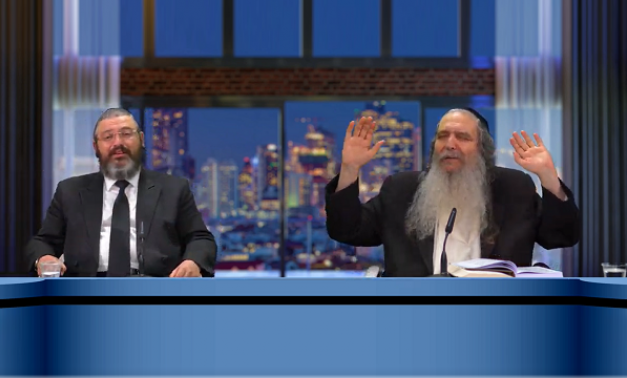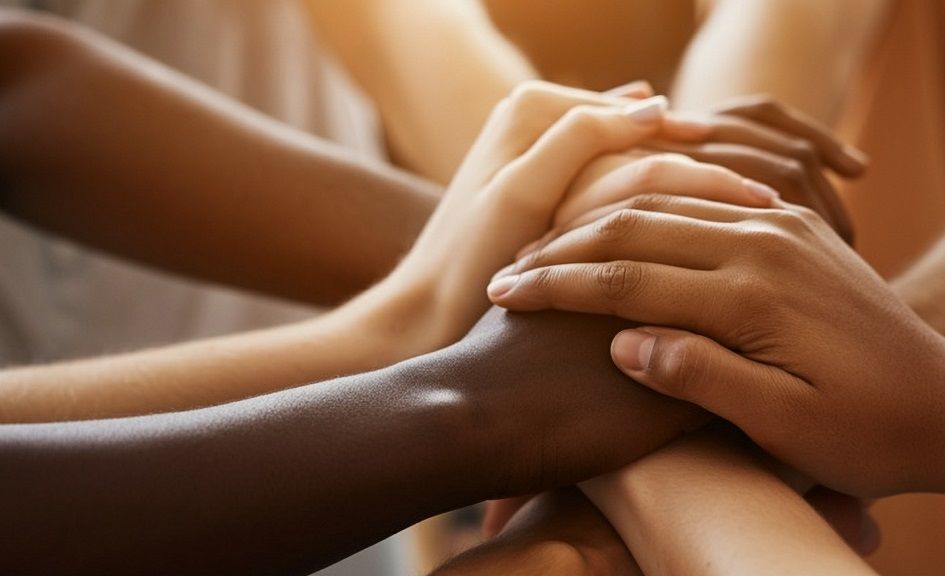
The Easy Way to Remove the Evil Eye
Let's stop focusing on all the craziness and instead look at the endless salvations and good that happen to each of us and to the Jewish People. There is much that is good! The final redemption depends on our learning to sing and give thanks!

Translated from Rabbi Arush’s feature article in the weekly Chut shel Chessed newsletter. The articles focus on his main message: “Loving others as yourself” and emuna.
It worked like magic. When they decided to give a chance to the idea of simcha (joy), they didn’t place much hope in it, but the results surprised them…
Motti and Dina’s life was full of tensions and fights. A very unpleasant atmosphere. They felt that someone had placed the Evil Eye on them, and they did all kinds of things to remove it, but nothing helped. Rabbis spoke to them – and it didn’t help. They began to get used to the idea that it was apparently a decree from Heaven, and nothing could be done to change the situation. Perhaps – they thought – it’s like that for everyone, and the problem is not only theirs.
One day, Motti took a bus to Meiron, and during the trip he met Simcha, a good friend of his from their days in yeshiva. They were happy to see each other and spent the long trip filling each other in on the years since they had last seen each other.
Simcha couldn’t help noticing that Motti was very frustrated with his marital life. He knew Motti’s family as well as Dina’s family and knew that both were good families, and both Motti and Dina were decent people, and he was pained to see their lives being so unpleasant for no reason at all.
He gave much thought to the question of whether to get involved. He wasn’t a certified marital counselor, and he didn’t have the strength or the tools to deal with other people’s problems. But before they reached their destination, he decided to give Motti a small piece of advice. If he would accept it – so much the better. He felt he had to make an effort.
“Motti,” he said somewhat hesitantly, “I want to give you a piece of advice that is very helpful for my wife and myself in our marriage. It’s worthwhile trying it. If it doesn’t help, it won’t hurt either. Do you want to hear it?” Motti did not object, and Simcha continued: “We sit every day for a few minutes and each one gives the other a list of ‘thank you’s – good things that the spouse has done for him and for the family during the day…”
After a warm good-bye, the two went into the tziyun to pray to Hashem.
Motti shared the idea with Dina and decided to try. In the beginning, it was somewhat forced and they didn’t feel anything. But very soon the daily conversation forced them to open their eyes and search for good things all day, so that they would have something good to thank each other for in the evening.
And… something happened in their home!
One can’t put a finger on what exactly happened, but their lives changed completely. It wasn’t only that the frequent disagreements decreased by 99 percent, but that they really enjoyed their time together. It was fun to meet and talk. The love returned. Their home began to flourish.
That is truly a removal of the ayin hara (Evil Eye). By saying ‘thank you’ they removed their own Evil Eye and gained ayin tova – a favorable outlook.
This is not just a piece of advice – it’s a way of life!
It is the most perfect way to perform the mitzvah of “You shall judge your fellow man fairly” (Vayikra 19:15), brought in our parasha. To judge someone favorably is not only for one deed; rather, it relates to the person as a whole. And just like it’s the right thing to do in interpersonal relationships, it is the right thing for our relationship with Hashem. True emuna has to come with a favorable outlook, only when you see Hashem’s goodness in front of your eyes all the time.
We have already written quite a few books on the advantages of gratitude (Rabbi Arush’s books). Gratitude brings about salvation. Not just gratitude towards Hashem, but “even” a couple thanking each other has the power to cause amazing changes!
And it’s not an ‘even’; clearly, gratitude is a way of life. Whoever thanks Hashem and appreciates Him, appreciates any human being, and his parents and wife in particular. And whoever is ungrateful towards his fellow man, will end up being ungrateful to Hashem as well.
But for most of us, unfortunately, the ‘thank you’ is not automatic, not natural. If we don’t force ourselves to stop for a moment and look for all the kindnesses and say ‘thank you’ – it won’t happen! To force yourself means to see it as a strong obligation. If you force yourself, you’ll see how good and pleasant it is, and you will find yourself truly wanting to give thanks, and you will feel true satisfaction and inner illumination. But if you don’t force yourself, you won’t do it at all, and that will affect the overall picture of your life. Wouldn’t that be a pity?
Gratitude Lenses
Since the terrible disaster of Simchat Torah, we are in an unending cycle of pain, disquiet, pressure, troubles, bad news, threats etc. May we know no more distress and hear only good tidings and complete yeshuot (salvations) for the Jewish People. But we must – must – stop focusing on all the craziness and look at the endless chassadim and salvations as well, at all the good that happens to us, and that Hashem does with the Jewish People – and there is much that is good.
We all remember that frightening night before Pesach when hundreds of missiles and drones were sent off [from Iran], with us as the target – and we saw Hashem’s salvation. Never was there such an attack. And we all remember the feeling of gratitude that filled us that morning when it all ended without any fatalities.
We all understand, as well, that with the tremendous, unbelievable pain of Simchat Torah, we still witnessed great yeshuot, because the results could have been many times worse, especially if those attacks would have come from a few directions at once.
All of us have heard during these past months of war of many miracles and salvations, with the greatest miracle being the tremendous awakening of the Jewish people to unite and work together.
And this obligates us to stop every day and say, ‘thank You’. To stop the routine and thank Hashem yitbarach for the great and small miracles, for the personal and general chassadim we experience. We mustn’t allow life to go by us blindly. We mustn’t ignore all this. We must stop and give thanks, even if it is for only a few minutes – some will thank more, some less – it doesn’t matter. In any case, it will have an effect! Undoubtedly and certainly! Even a few minutes a day will affect the entire day!
Whoever manages to do this will get “gratitude lenses” and be able to note the sweet and good aspects of reality and see Hashem’s goodness at every step, and life will be much pleasanter and sweeter.
A Contagious Cure
This “small” thing is so powerful that it can bring us the Mashiach. Because Hashem yitbarach wanted to make Chizkiyahu Hamelech the Melech Hamashiach, but he didn’t say a shirah (song) after the miracle happened to him. Because of that he was not the Mashiach, and we didn’t have the merit to see the Geula (Redemption) at the time. (Sanhedrin 94 a)
From this we learn that the benefits of the shirah are so great, that the coming of the Mashiach depends on it! The greatest yeshua of the Jewish people depends on our learning to sing and give thanks!
Therefore, stop for a moment every day and say, ‘thank You’. Feel the gratitude in your heart until it illuminates it and say Mizmor letoda (Psalm 100) with great concentration (see The Deeper Meaning of Psalm 100), along with Nishmat kol chai, and Hallel (without a bracha). Sing and dance with your family members. Express your gratitude in words and in actions, in song and praise to Hashem.
Often, a person suffers in his life only because of the lack of saying ‘thank You’, like Motti and Dina in our story above, and the solution is so simple that it’s amazing: “Say ‘thank You’ and everything will change! Completely! A life of thankfulness is a different life.
There are diseases that are contagious, but thankfulness is a contagious cure, contagious salvation. When a Jew and all the Jews say, ‘thank You’, they bring upon themselves more miracles and more salvations and more cures and more good influences. If you say ‘thank You’, you will receive many more reasons to be grateful, and your life will become a continuum of ‘thank You’s and song. And when we will all live lives of gratitude, we will be able to prepare to hear the shofar of the Mashiach, soon, in our days.












3/17/2025
Thank you for this aricle. I needed to read this right now.